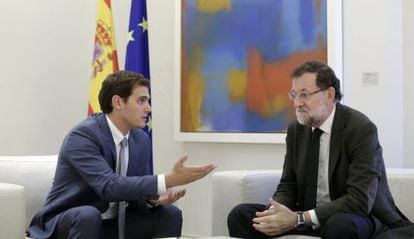PP and Ciudadanos to examine ways of kick-starting political term
Party chiefs Rajoy and Rivera agree to explore methods of breaking political deadlock

With Spanish politics in stalemate since the December 20 election yielded a hung parliament, the emerging Ciudadanos party wants to act as a mediator to get lawmakers working again. Acting Prime Minister Mariano Rajoy, whose Popular Party (PP) won the most seats (123) but fell short of a congressional majority (176), has agreed with Ciudadanos leader Albert Rivera that both parties will seek formulas to create a minority government and kickstart the political term.

But Ciudadanos’ 40 seats are insufficient for a majority with the PP. Instead, Rivera will try to talk to Socialist Party (PSOE) head Pedro Sánchez, who holds 90 seats, putting himself in the role of mediator between Spain’s two main political groups.
“There are people who see the current situation as a problem,” said Rivera. “I like to see it as an opportunity to make the kind of reforms that the PP and PSOE never made. If we manage very broad support, it’s a chance to create a great agreement to help improve the Constitution.”
“I like to see the current situation as an opportunity to make the kind of reforms that the PP and PSOE never made”
“In order to push forward the changes that Spain needs, we need to have a government,” added José Manuel Villegas, deputy secretary general for Ciudadanos. “We will sit down with the PSOE and PP in the coming days to seek that consensus.”
So far, Sánchez has refused to support Rajoy’s reinstatement bid and will not vote for him at the upcoming investiture session, much less enter a grand coalition with the PP chief. Rather, the Socialist leader favors an alternative alliance that would include the anti-austerity Podemos and regional parties from Catalonia and the Basque Country.
But the Socialists and Podemos are stalling on the conditions for cooperation because of significant differences on issues such as the right to a Catalan self-rule referendum. Last Friday Podemos leader Pablo Iglesias offered Sánchez to partner in a government where he would personally act as deputy prime minister, but Sánchez reacted cautiously to the offer.
Also on Friday, Rajoy told King Felipe VI that he would not stand for reinstatement at the investiture session because he knows he lacks sufficient votes to win.
Rivera will propose a minority government that would be committed to a specific calendar of reforms
With no candidate ready to step forward because of lack of support, Rivera will now propose to both the PP and PSOE a minority government that would be committed to a specific calendar of reforms on issues such as education, the voting system and party law. Each of these reforms would require a broad, case-by-case consensus in parliament for passage.
Rivera also said that he would not ask to be part of this executive, and that the names of the new prime minister and ministers should not be negotiated until after the reform calendar has been decided.
English version by Susana Urra.












































